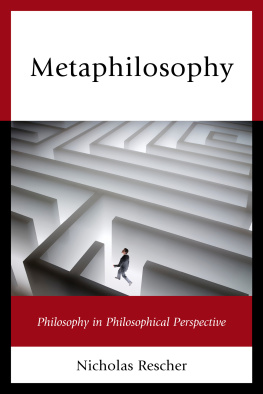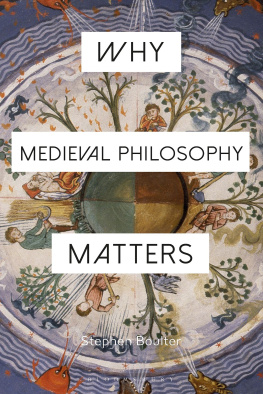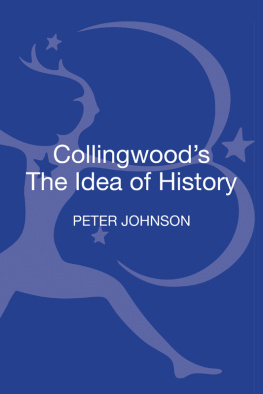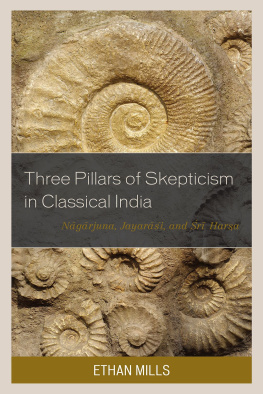The Foundations of History
Collingwoods Analysis of Historical Explanation
Stephen Leach
imprint-academic.com
2017 digital version converted and published by
Andrews UK Limited
www.andrewsuk.com
Copyright Stephen Leach, 2009, 2017
The moral rights of the author have been asserted
No part of this publication may be reproduced in any form without permission, except for the quotation of brief passages in criticism and discussion.
Imprint Academic
PO Box 200, Exeter EX5 5YX, UK
To My Parents
Preface
In my first years of studying philosophy at university I found myself in vague agreement with every different school of thought that I encountered. I imagine that this may be an experience held in common by many well-taught students. Realism, idealism, positivism, pragmatism - of every one I thought, theres something to it: but surely they could not all be right.
It was in the hope of better establishing my own position that I then turned to R.G. Collingwoods philosophy of history. For, knowing that Collingwood had worked in archaeology, and having worked for some years in archaeology myself, albeit at a humble level, I hoped that in reading his philosophy of history the criterion of this shared experience might help me to make up my mind upon philosophical problems with greater certitude than previously. Thus, it was not as a result of an immediate attraction to his philosophy that I came to study Collingwoods philosophy, nor was it the result of instruction from a favourite teacher.
Nonetheless, by the time I had finished the thesis upon which this book is based, I had come to think of Collingwood and, his modern-day expositor, my tutor Giuseppina DOro, as my mentors. Of course there are areas in which my ideas differ from theirs, but this is an opinion that I retain. I could not have asked for better teachers than R.G. Collingwood and Giuseppina DOro.
Acknowledgements
I would like to thank my tutor, Dr. Giuseppina DOro - for taking time to read the many different drafts of the thesis upon which this work is based and for her many constructive criticisms. Thanks also to my second tutors, Professor John Horton and Professor Hidemi Suganami; to Professor James Connelly and Dr. James Tartaglia, the referees of my thesis, for their comments and criticisms; to Professor David Boucher and to my first philosophy teacher, Dr. Katerina Reed-Tsocha.
A version of Chapter VI, The Ontological Argument, was first published in Collingwood and British Idealism Studies 14: 1, 2008 under the heading of Collingwoods Ontological Argument. A version of the section of Chapter II under the heading of An Appreciation of R.G. Collingwood as an Archaeologist was first published in Bulletin of the History of Archaeology 19: 1, 2009 under the heading of Appreciation of Collingwood as an Archaeologist. I am grateful to the editors of both these journals for permission to reprint this work.
Finally, for providing inspiration, I would like to thank Ms. Kirsten Jarrett.
Stephen Leach, 2009
Abbreviations
Religion and Philosophy (1916) | R.P. |
Speculum Mentis (1924) | S.M. |
An Essay on Philosophical Method (1933) | E.P.M. |
The Principles of Art (1938) | P.A. |
An Autobiography (1939) | A. |
First Mates Log (1940) | F.M.L. |
An Essay on Metaphysics (1940) | E.M. |
The New Leviathan (1942) | N.L. |
The Idea of Nature (1945) | I.N. |
The Idea of History (1946) | I.H. |
The Principles of History (1999) | P.H. |
The Philosophy of Enchantment (2005) | P.E. |
I. Introduction
This book is intended to provide a thorough exposition and critical examination of R.G. Collingwoods philosophy of history and to locate Collingwoods views in relation to recent and current philosophy. My views are in general sympathetic to Collingwoods, though with several major caveats.
Part I is devoted to Collingwoods views on the nature and task of philosophy. Collingwood is relatively unusual among recent philosophers in that he devotes great attention to metaphilosophy, in particular to the question of the relation between philosophy and its subject matter. He argues that part of philosophys subject matter is itself, for:
If the first principles of philosophy are to be justified, they must be justified by philosophy itself.
Collingwood is aware that this suggests circularity, since:
This can only be done if the arguments of philosophy, instead of having an irreversible direction from principles to conclusions, have a reversible one, the principles establishing the conclusions and the conclusions reciprocally establishing the principles. But an argument of this kind, in which A rests on B and B rests reciprocally on A, is a vicious circle. Are we to conclude that philosophy is in a dilemma of either renouncing this characteristic function and conforming to the irreversible pattern of exact science, or else losing all cogency in a circular argument?
Collingwoods answer is that, once the futile search for justified foundational beliefs is abandoned, what at first appeared as vicious circularity may be exploited to good effect. For it is by virtue of this trait - philosophys reversible direction - that the philosopher, when he turns his gaze outwards, is able to show us what, in an obscured sense, we already knew but had never made explicit. In particular, and as will be shown, philosophy is able to discover and bring to light other disciplines absolute presuppositions, whilst yet retaining its own autonomy.
By absolute presuppositions Collingwood refers to those presuppositions that are logically basic and distinctive to the particular disciplines that they underlie. Collingwood terms the attempt to recover these absolute presuppositions metaphysics without ontology. This term is intended to convey that the form of metaphysical inquiry proposed is a logical inquiry and is unconcerned with the ontological status of that which it studies.
However, despite advocating metaphysics without ontology, Collingwood also argues that the metaphysician must be committed to the existence of that which he studies - for the nature of his subject matter implies its existence. I argue, against Collingwood, that philosophical studies of the sort that he advocates can be productively pursued without any form of ontological commitment.
Part II is devoted to the exploration of Collingwoods philosophy of history and his attempt to recover the absolute presuppositions of history. In Collingwoods view to explain historically is to understand the reasons for which historical agents act. In historical explanation the connection between explanandum and explanans is a rational connection. In this fundamental respect, historians explanations differ from natural scientists causal explanations in which events are explained when they are seen to follow as instances of general laws.
I argue that when Collingwoods views are reconstructed in the light of his metaphysics without ontology it becomes clear that his primary concern is with the conceptual project of recovering historys absolute presuppositions, rather than with the provision of a methodology. I also make clear my sympathy for Collingwoods account of action explanation and in particular for his view that the mind-body problem in the philosophy of mind is essentially bogus. (This view is discussed in relation to Donald Davidsons). However, in the penultimate chapter I argue that the subject matter of history may be wider than Collingwood suggests. I argue that there may be more to history than action explanation, and that it may be a mistake to regard the philosophy of history as synonymous with the philosophy of action. I also suggest that we should distinguish between the foundations of history and the foundations of archaeology.
Next page







